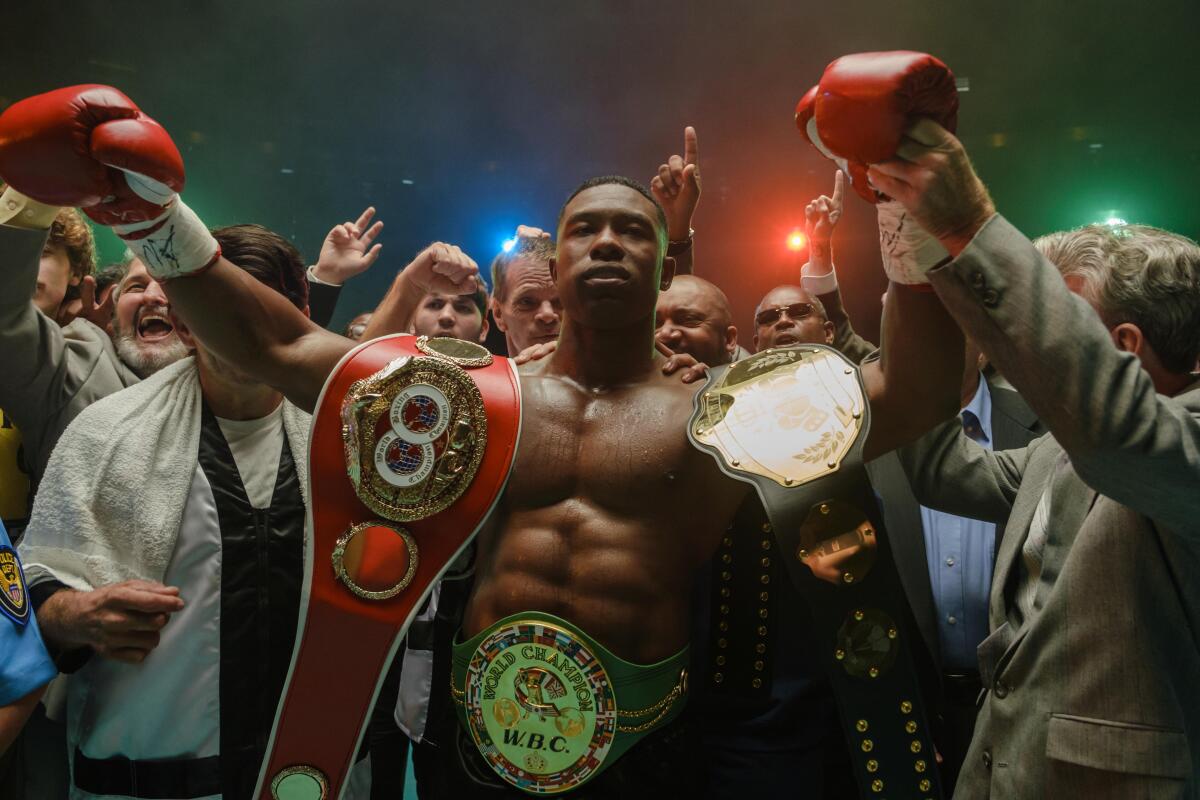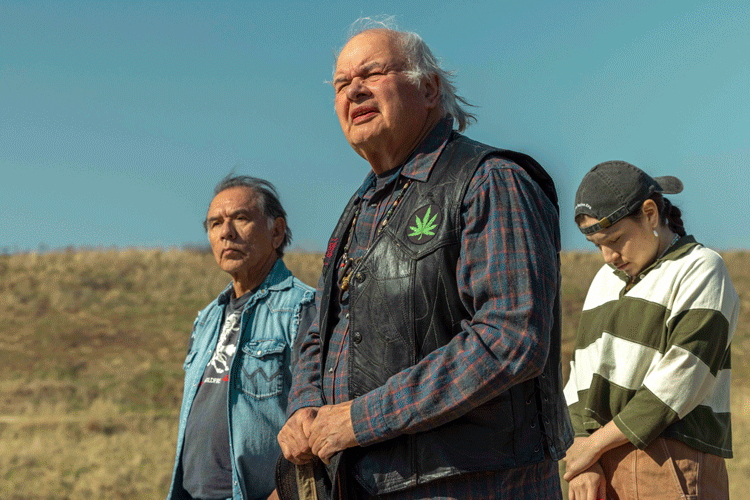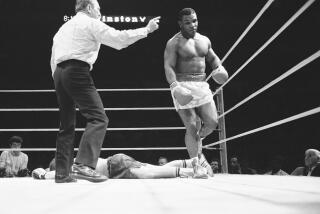‘Mike’ tries to capture the drama of boxer Tyson’s life. It doesn’t measure up

After Muhammad Ali, there is no boxer who has made a greater mark on popular culture, for better or worse, than Mike Tyson.
There were cameras trained on him when he was still a teenager, living at manager/trainer/legal guardian Cus D’Amato’s house, and over the years he’s been the subject of many documentaries, made with or without his cooperation. He’s appeared as a cameo and occasionally a straight performer on television, in the movies and in music videos, most famously as the subject of DJ Jazzy Jeff and the Fresh Prince’s “I Think I Can Beat Mike Tyson.” He’s been a reliably entertaining guest on myriad late- and late-late-night talk shows. He’s also mounted a one-man stage show, “Mike Tyson: Undisputed Truth,” directed by Spike Lee and filmed as an HBO special; raced pigeons in Animal Planet’s “Taking on Tyson”; starred in the Adult Swim cartoon series “The Mike Tyson Mysteries”; hosted the podcast “Hotboxin’ With Mike Tyson” and been a guest on many others. (Not to mention a recent viral video in which he punches a fellow passenger who was annoying him on a plane.)
For all the ups and downs in his career and his life, since sports journalists first took notice of him he has never been long out of public view, and he has never lacked for fans, even after the 1992 rape conviction that sent him to jail for three years.
Now, as if we needed more, comes Hulu’s limited series “Mike,” the second biographical drama devoted to the fighter after the 1995 “Tyson,” with Trevante Rhodes in the title role and Harvey Keitel as D’Amato. It has been made with evident research, but necessarily with some imagination: You can re-create the fights and archival news footage and interviews, including an appearance on Joan Rivers’ late-night show and Barbara Walters’ headline-making sit-down with Tyson and actor Robin Givens (Laura Harrier), who was briefly his wife. You can mine the record for odd lines of dialogue. But every private conversation is a matter of invention, and every performance is a matter of interpretation. Any biopic is a poor place to come in search of the truth.
What’s more, even by his own admission, Tyson is such a self-contradictory figure — sensitive, violent, insecure, arrogant, thoughtful, impulsive, disciplined, undisciplined and, as he was coming up, literally a boy in his man’s body — that it’s hard to put a frame around him. (“You mighta done bad things,” D’Amato tells him, “but you got a good heart.”) As much as the filmmakers might try not to take a side, the very existence of “Mike,” and the fact that it’s (largely) narrated by its subject — sometimes in the context of the stage show, sometimes straight to the camera within a scene — does create an implicit partiality.
We surveyed The Times’ TV team to come up with a list of the 75 best TV shows you can watch on Hulu.
And apart from Tyson, whose voice and body language Rhodes effectively captures, every other character (at least in the five of eight episodes out for review) is a supporting part; some get enough screen time to make an impression, but they come and go. Few scenes last long enough to gather any dramatic weight, and relationships are more suggested, or simply stated, than explored. That isn’t to say that some aren’t affecting — the actors see to that, though they must often work against the series’ stylistic breeziness. Rhodes has a couple of sweet scenes with Chédra Arielle, as his sister, Denise, and a near-deathbed scene between Tyson and D’Amato, which might have been lifted whole from a Depression-era boxing film, is sentimentally effective:
“Listen to me. You succeed when you become champeen; I only succeed when you don’t need me anymore.”
“I do need you, Cus. I do. I love you, Cus.”
But you never get near the bottom of things. Indeed, that might be too much to ask of a project like this, which wants to swallow a life whole, rather than examining a representative aspect at length. It’s a common enough problem among biopics.
Directed by Craig Gillespie and written by Steven Rogers (who teamed on the film “I, Tonya”), “Mike” begins with an echo of Martin Scorsese’s “Raging Bull,” as Tyson throws punches in a dressing room mirror before performing his stage show, which will form a spine throughout the series. (The version here is less mean and self-serving than the one captured in the HBO special.) Indeed, Scorsese feels like an inspiration throughout, with short scenes and montages driven by narration, as in “Goodfellas”; the R&B soundtrack that accompanies scenes set in the mean streets of Brownsville, Brooklyn; the slow-motion parade of fighters’ faces being hit; the relentless restlessness of the camera work; and, not least, the casting of Keitel. Coincidentally, or not, Scorsese had long planned to direct a Tyson film, to star Jamie Foxx; the project is now slated to become a Scorsese-produced limited series — this time, with Tyson, who has had bad words for “Mike,” on board.
The complete guide to home viewing
Get Screen Gab for everything about the TV shows and streaming movies everyone’s talking about.
You may occasionally receive promotional content from the Los Angeles Times.
In many ways Tyson’s story is broadly shaped like any number of sports or show business films (including the 1947 John Garfield classic “Body and Soul”) as a tale of a child from humble circumstances whose success leads to ruin and eventually redemption. (Notwithstanding that airline video, Tyson nowadays presents as a self-deprecating, self-reflective family man, with a sense of perspective and a sense of humor, long past the need to throw punches in order to feel good about himself.) From a bullied child he becomes a vicious street fighter (the killing of one of his beloved pigeons is what first sets him off); a career in theft at elementary-school age lands him in a reformatory, where he discovers boxing; his teacher recognizes his talent and brings him to the door of D’Amato, who had trained champions Floyd Patterson and Jose Torres. D’Amato takes Tyson under his wing, and into his household. Together they set off to make him world champion, though D’Amato dies before this happens — his ghost does pop in to offer encouragement — leaving the young man rudderless. Tyson’s need for a father figure is a theme.
Marriage to Givens makes them a power couple, but it collapses as power struggles come into play. Single again, Tyson spends and dates, if that’s the word, profligately. (“I’m sorry, Mr. Tyson,” he’s told, “we never put a hot tub in a limousine before,” but money gets it done.) Promoter Don King (Russell Hornsby), sensing an opportunity, swoops in — a replacement father figure. (“Cus taught me how to box, but he couldn’t teach me how to be a Black man in America.”) He ultimately proves toxic, but the character does get one inspirational speech, and Hornsby imbues him with a smidgen of tenderness.
Weakened by his rake’s progress, an unmotivated Tyson travels to Tokyo, where he loses his belt to Buster Douglas. Then comes Desiree Washington (Li Eubanks). The fifth episode, which concerns the rape case — denied by Tyson and many supporters — takes the smart, even necessary step of viewing events through the eyes of the victim. It’s the change of perspective the series needs and engenders fresh thoughts not only about Tyson, but the culture that reflexively supports a celebrity, not to mention a man against a woman. (A particularly nasty meeting held by Louis Farrakhan is partially re-created.)
Just what the unseen three episodes will portray, I can’t say, though there are drugs, a face tattoo, the unraveling of his boxing career and a measure of peace in his factual future. (Also a cartoon.) But “Mike” does seem intent on ticking off the bullet points of Tyson’s life; its aspirations feel serious, even if the end product doesn’t always measure up.
And if you’re interested in what made Mike Tyson a successful boxer, beyond the ability to deliver and take a punch, or even what makes boxing interesting beyond belts and paydays, you had best look elsewhere — and there is no lack of places to look.
‘Mike’
Where: Hulu
When: Anytime, starting Thursday
Rating: TV-MA (may be unsuitable for children under the age of 17)
More to Read
The complete guide to home viewing
Get Screen Gab for everything about the TV shows and streaming movies everyone’s talking about.
You may occasionally receive promotional content from the Los Angeles Times.








